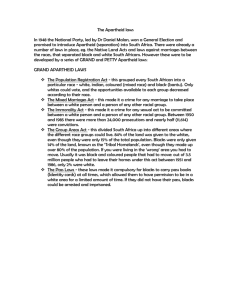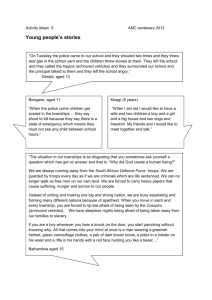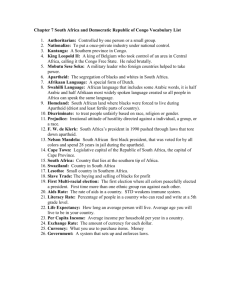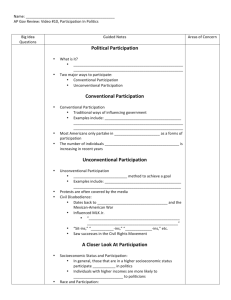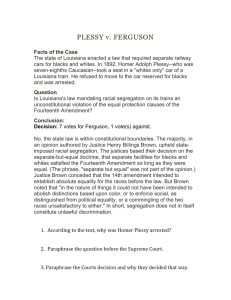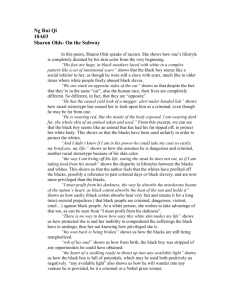South Africa
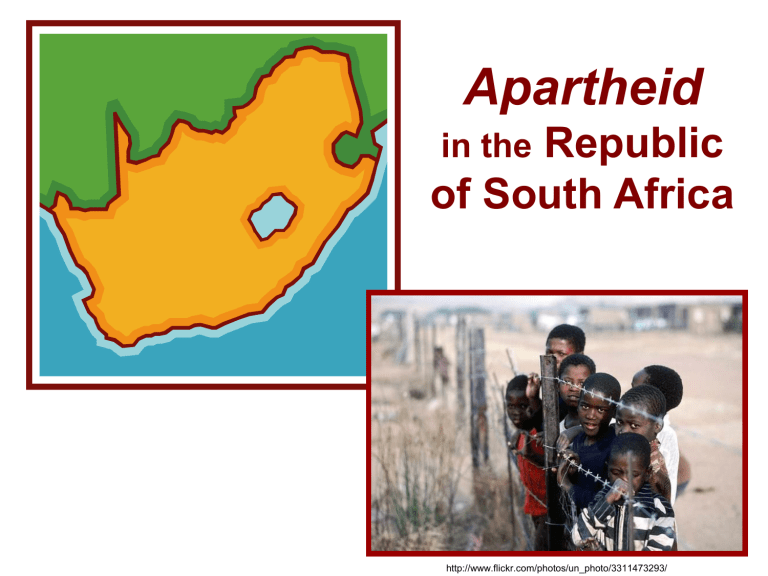
Apartheid
in the
Republic of South Africa
http://www.flickr.com/photos/un_photo/3311473293/
Only 9 % of South Africa’s population is
White, but
Whites ran the country from the
1700s up to
1994. http://thewe.cc/weplanet/africa/south_africa/darling_walter_longing_for_you.htm
The worst time was the “Apartheid,” between 1948 and 1994, when South
Africa passed 317 different laws to control Blacks and Coloureds in South
Africa.
Some examples . . .
http://vlpmaricopa.org/VLP/clc/pics/clipart.jpg
1949: The Mixed Marriages Act made it illegal for Whites to marry Natives
(Blacks) or Coloureds.
1950: Immorality Act
Since they could not legally get married, some Whites were just living with their
Native (Black) or Coloured partner. This law made that illegal, too.
Under this law, Whites were not allowed to live with or date Natives
(Blacks) or Coloureds.
1950: Population Registration Act
All South African citizens were officially classified as White, Native African
(Black), Coloured (mixed), or Asian.
If there was disagreement about someone’s race, the white government decided.
As a Coloured, apartheid taught me to think I’m better than Blacks but that I can
never be as good as
Whites.
They must have feared that if we got to know Blacks and saw the good in them, then we might work together with them to destroy the whole system of apartheid.
No More Strangers Now : Young Voices From a New South Africa , interviews by Tim McKee. DK Pub., 1998.
Nithinia Martin, 18 years old
1950: Group Areas Act classified land as “land for Native Blacks,”
“land for Coloureds,” and “land for
Whites.” If you already lived in a “wrong” area, you had to move.
The best city land, industrial areas, and farmland were reserved for
Whites.
http://www.wild-about-travel.com/2011/12/soweto-students-uprisings-1976/
“Townships” were set up for Native
Blacks. They were usually fairly close to
White cities.
Why would Whites want native Blacks fairly close? http://blogs.crikey.com.au/back-in-a-bit/2010/09/14/visiting-soweto-by-foot/ http://images.mirror.co.uk/upl/m4/jun2009/9/4/a-south-african-township-pic-getty-744778275.jpg
This gave White factories cheap workers near enough to work for them, but not near enough to be their neighbors.
Cities/towns for whites townships for
Native blacks, coloureds, and
Asians http://africanhistory.about.com/library/bl/blApartheid-TownshipMap.htm
1950: Suppression of Communism
Act made the Communist Party illegal in
South Africa. However, it also allowed authorities to label any person protesting against the government as a
“communist” so they could arrest them.
1951: Separate Representation of
Voters Act took Coloured & Asian voters off the national voter rolls.
1952: Natives Act (Passes Law) required all Native Africans (Blacks) to carry an official work pass with them whenever they left their townships.
If you were stopped and didn’t have your pass, you would be arrested.
http://linsinthecpt.wordpress.com/
The pass book included a photo ID, birth place, birth date, employment record, tax payments, and any interaction with police.
http://www.sahistory.org.za/south-africa-1806-1899/pass-laws-south-africa-1800-1994
Many Native Blacks worked in White areas. At night, a siren would sound in the cities and White towns.
It meant non-Whites had to be off the streets in
White areas.
Some places were harsher than others when enforcing this.
http://4.bp.blogspot.com/-5henpTC7n0Q/TcjC8jz3f-I/AAAAAAAAABI/qC9ayd0mnck/s1600/BAHA-apartheid-signage.jpg
Many Native Blacks maids and gardeners lived with their White employers. Their spouses and children were not allowed to live with them.
Children were raised by friends or relatives in the Black townships. Families were separated under this system.
1953: Bantu Education Act said public schools could not be racially mixed.
Schools for Native Blacks could no longer teach much math or science.
Government leaders explained: “We don’t want Native
African kids to think they can grow up to do the same things White kids can do. So we’ll only educate them to be maids, cooks, mine workers, gardeners
– to work with their hands.”
In the U.S., working with your hands can pay fairly well (auto mechanics, electrician, plumber, etc.). But in South Africa, those jobs did not pay well.
“I grew up on a White family’s farm. My father worked with the sheep and my mother cooked and cleaned in the White family’s house. My parents
never got a day off. They worked 365 days a year.
I didn’t go to school until I was ten. The White family discouraged my brother and me from going to school. They worried that we would get some knowledge and then want a
better life. They wanted me to spend my life working for them.”
No More Strangers Now : Young Voices From a New South Africa , interviews by Tim McKee. DK Pub., 1998.
Nomfundo Mhlana, 19 years old
Native Black public schools received about 1/10 of the money – per student
– that White public schools received.
http://xenon.stanford.edu/~cale/cs201/apartheid.hist.html
1953: Reservation of
Separate Amenities Act required separate facilities for Whites and “others” in public services, public buildings, and public transportation.
The goal was to stop casual contact between White and other races.
http://www.twcenter.net/forums/showthread.php?t=266421
This included almost everything: bathrooms, beaches, http://mrphinizy.wikispaces.com/Apartheid+in+Literature
athletic events, busses & bus stops.
http://www.unmultimedia.org/radio/library/classics/detail/908.html
http://www.boston.com/bostonglobe/photos/photos_galleries/apartheidsouthafrica?pg=7
1970: Bantu Homeland Citizens Act declared all Blacks to be citizens of their “homeland” ( instead of citizens of
South Africa). http://www.dailymaverick.co.za/images/legacy_resized_images/2010-04-28-sophiatown-313-600-313.jpg
http://marllkm.edublogs.org/
